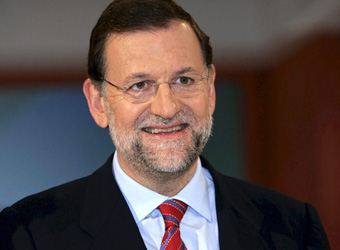Spain’s government has given Catalonia three days to declare whether it will try to break away from Spain or not, moving ever closer towards imposing direct rule on the northeastern region.
Madrid had given a deadline of 9:00 a.m. London time Monday for an official response from Catalonia, hoping to receive a clearer indication on whether it had declared independence or not.
However, when a letter arrived from Catalan leader Carles Puigdemont just two hours before the deadline, it failed to offer any confirmation either way.
Spain’s Deputy Prime Minister Soraya Sáenz de Santamaría told a news conference later on Monday that Puigdemont had not made his position clear and the government would give him until Thursday morning to give a formal confirmation.
“It’s not a hard question we have asked, it’s not a hard question to respond to,” she said.
“10:00 a.m. (local time) on Thursday is the deadline,” she added. “We are very disappointed he hasn’t given a yes or no answer to the question we asked.”
“He is prolonging the situation,” she said.
Sáenz de Santamaría stated that Prime Minister Rajoy would also be publishing a response to Puigdemont’s letter this morning.
Spain’s Justice Minister Rafael Catala also added to the discussion on Monday morning, reportedly saying that the response from the Catalan leadership was not valid.
The initial letter from Catalonia early Monday reiterated an offer by Puigdemont to meet Rajoy as soon as possible to discuss the situation, and asked that dialogue take place over the next two months.
Madrid reaction
The latest war of words comes after a demand for clarity from Rajoy last week after Puigdemont made an ambiguous statement last Tuesday in which he seemed to declare independence before suspending it, calling for dialogue with Madrid.
If a declaration of independence is pursued at this further deadline on Thursday, Rajoy has said he would be ready to invoke Article 155 of the Spanish Constitution — the so-called nuclear option — which would allow him to sack the regional government and call for fresh elections.
This scenario is still likely, according to analysts.
“If the Catalan government chooses a hard line, we expect that Article 155 will be triggered (there are three more days for that to happen, with a final deadline set for next Thursday). While it is difficult to predict the exact contours of its implementation, we foresee that in due time a new regional election will be called in an attempt to restore the normal institutional set up,” JPMorgan economist Marco Protopapa said in a note last week looking ahead to the deadline.
The Catalonia government — which had been emboldened to pursue independence following a non-binding referendum in the region in which a majority of voters voted for secession — had subsequently been weakened, in Protopapa’s view, by a fracture within the pro-independence camp between more radical hard-liners and more moderate elements calling for dialogue with Spain.
In addition, a number of high profile businesses have threatened to relocate out of the northeastern region and the European Union has said an independent Catalonia would find itself isolated, outside the bloc.
Protopapa said the Catalan government “had been weakened by these events” while Bob Parker, investment committee member at Quilvest Wealth Management, who told CNBC Monday that the Catalonia crisis was a high-stakes event.
“Catalonia accounts for close to 20 percent of the Spanish gross domestic product (GDP) so there are some very big stakes here on this debate between Madrid and Barcelona,” Parker said.
“If Catalonia did become independent that would have some significant negative effect on the Spanish economy which is why investors have been looking at this very clearly.”
Source: CNBC


